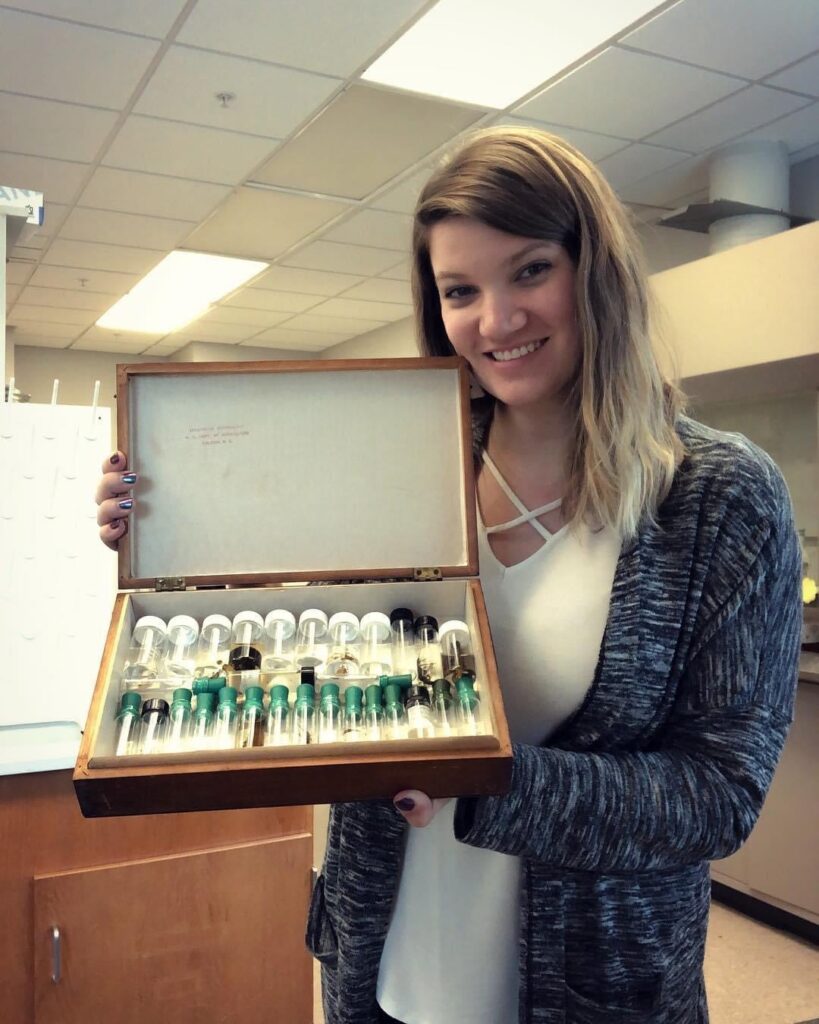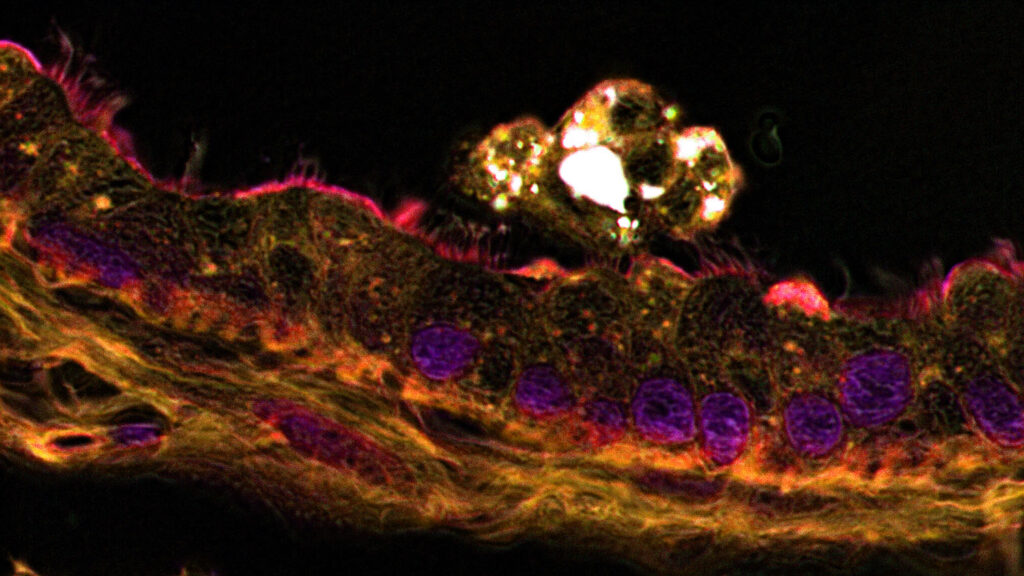
PhD Program
Our PhD program provides multidisciplinary didactic training in toxicology, molecular and cellular biology, molecular genetics, data science, and statistics.
Our PhD program provides state of the art course work and research opportunities
The PhD program is designed to train students to become independent scholars capable of conducting intensive original research. Students benefit from the cohesiveness of the program structure (weekly seminar, journal club, faculty-student, student-student interactions, etc.) and from the interdisciplinary nature of the program.
Path to a PhD
Rotations
During their first semester, PhD students participate in three laboratory rotations (5 weeks each). These rotations allow students to learn new skills, experimental approaches, and to become involved early on in the process of scientific inquiry. On the basis of these rotations, students select a research area and major faculty advisor for dissertation research.
Core Curriculum
Students enroll in a core curriculum and additional courses as determined by his/her advisory committee. Graduate students majoring in Toxicology must have an adequate background in biological and physical sciences or make up existing deficiencies upon recommendation of the Director of Graduate Programs and/or the Graduate Student’s Advisory Committee. Please see the Student Handbook for the most up to date Plan of Work.
Dissertation
All students are required to establish a dissertation committee. The student’s Advisory Committee shall have responsibility for delineation of a program of study which includes the minimum specified courses and such additional courses as needed to provide background and direction of each individual student. The chairperson or co-chairperson of the student’s committee must be a member or associate member of the Toxicology Faculty. It is strongly recommended that at least one of the committee members be from a department/program other than Toxicology.
Students must pass both a written and oral preliminary exam prior to advancing to PhD candidacy. A doctoral dissertation presenting the student’s original research is written and defended in a final oral examination.
Research

Toxicology research at NC State spans an array of topics ranging from the molecular to population level consequences of toxicant exposure that align with key thematic areas described in the NIEHS 2018-2023 Strategic Plan and a systems toxicology paradigm:
- Emerging Contaminants
- Environmental Epigenetics and Genetics
- Mechanisms of Susceptibility
- Computational Toxicology and Data Science
Mentoring
Each research area includes an interdisciplinary mix of faculty. Many individual mentors’ research cuts across disciplines including genomics, epidemiology, exposure science, statistics, bioinformatics, genetics, cell biology, engineering, and molecular toxicology. These disciplines integrate and build on NC State’s unique research strengths and resources in quantitative biology, diverse model organisms, genetic/molecular/cellular-based systems, and its emerging strength in human population-based science.
Thus, while listed in a single category, several mentors may be affiliated with more than one strategic research area. Mentors from all four research areas contribute to toxicology training through participation in core curricula, development of new curricula, hands-on mentoring in a laboratory environment, and one-on-one faculty-student mentoring.
Concentrations
Doctoral students elect one of three concentration in Toxicology/Environmental Health Sciences to emphasize their area of research.
General Toxicology
The General Toxicology Concentration is designed to accommodate students who wish to obtain a broad toxicology background, perhaps bridging both the Environmental and the Molecular and Cellular Concentrations. Students electing this option may wish to pursue research in more traditional areas of toxicology including fate and metabolism of toxicants, organ and cellular toxicity, endocrine disruption, mechanisms of insecticide resistance, residue 27 analysis, teratogenesis, etc. Students electing this option may conduct research in any area of toxicology, but their coursework may reflect a broader base of knowledge than those within the other subdisciplines.
Environmental Toxicology
Toxicology is a multifaceted discipline that incorporates mechanistic and descriptive evaluations of the impact of toxic agents at various levels of biological organization ranging from molecules to ecosystems. Students electing the Environmental Toxicology Concentration typically approach toxicology from a top-down perspective. That is, toxicological issues are initially addressed at higher levels of biological organization (i.e., communities, populations, individuals). Research into the issue is often conducted in a downward direction (i.e., organ, cell, and molecule). Research conducted by students enrolled in the Environmental Toxicology Concentration include:
- Evaluating gene expression profiles as related to toxicity and adaptive responses of chemical-exposed populations;
- Assessing the environmental fate and bioavailability of environmental contaminants originating from pesticide use, hazardous wastes, etc.;
- Elucidating mechanisms responsible for altered sexual development of chemical-exposed populations;
- Evaluating phylogenetic relationships in susceptibility to toxicants;
- Modeling and assessing toxicity of environmentally relevant chemical mixtures.
Research activities in the Environmental Toxicology Concentration involve many model organisms including fish, crustaceans, insects, and mussels.
Molecular and Cellular Toxicology
Molecular and Cellular Toxicology (MCT) encompasses the study of the effects of xenobiotics on cells and cellular macromolecules and is focused on understanding the cellular and molecular mechanism of toxic/stressor action. The purpose of the MCT graduate study concentration is two-fold: (1) to encourage scientific interactions between faculty and students interested in Molecular and Cellular Toxicology, and (2) to provide students with research training in this discipline.
The MCT graduate study concentration provides opportunities for graduate students to utilize modern molecular and cellular approaches to investigate complex biological processes such as carcinogenesis, cell-cycle regulation, cellular signaling, DNA damage and repair, regulation of transcription, genetic susceptibility and polymorphisms, and the molecular/cellular basis of adverse effects of cellular stressors including cytokines, reactive oxygen species, carcinogens, radiation, and a variety of pharmacological and environmental agents. An understanding of the role and function of specific genes in the above processes is a common goal of many of the research programs within MCT.
Students electing to join the Molecular and Cellular Toxicology Concentration conduct their dissertation research in areas related to understanding the molecular and cellular mechanisms through which xenobiotics/cellular stressors produce their adverse effects.
Graduate Toxicology Minor


Join a top environmental health research PhD training program